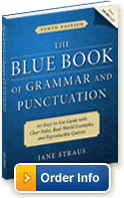|
Welcome to your GrammarBook.com E-Newsletter.

|
“I love your weekly E-Newsletter with its grammar tips. I feel great when I get 100% on the quizzes!”
—Martha R.
“Thanks for making the grammar rules so easy to understand.”
—Rahou H.
“I have used your books a number of times to help my students—not to mention myself.”
—Anthony D.
|
|
|
Two More Reasons Pronouns Plague Us
For several weeks now, we’ve been counting the ways that pronouns give us nightmares. Today we’ll look at two more culprits: infinitives and verbs that end in -ing (known technically as participles and gerunds).
To form an infinitive, precede a verb with the word to. The infinitive of look is to look. Constructions like to be looking, to have looked, and to have been looking are also infinitives.
Note what happens if we paraphrase I believe he is honest, using an infinitive: I believe him to be honest. The presence of the
infinitive (to be) turns he (the subject of is) into him (the object of believe).
If we change the statement to a question, should we use who or whom? The rule of thumb we discussed when this series began in September
is who = he (subject) and whom = him (object). So it would be correct to say Who do you believe is honest? (Who is honest, do you believe?)
But with an infinitive, Whom do you believe to be honest? would be correct. (Do you believe him to be honest?)
The situation is similar with verbs ending in -ing. There are times when an -ing verb in a sentence lets you say the same thing with
either a subject pronoun or an object pronoun. For instance, you could say We recall she was driving home or We recall her driving home.
Again, converting those statements to who-or-whom questions poses a challenge. Who do you recall was driving home? would be correct. (Who was driving home, do you recall?) And Whom do you recall driving home? would also be correct. (Do you recall her driving home?)
Such fine distinctions further illustrate why certain everyday pronouns are endlessly confounding.
To be continued…
Due to the E-Newsletter's large readership, please submit your English usage questions through GrammarBook.com's “Grammar Blog.” |
|
Pop Quiz
Find the grammatically correct pronouns.
1. I discovered they/them and Al sleeping in the barn.
2. I discovered they/them and Al were sleeping in the barn.
3. Mary trusted we/us and the team would return her car.
4. Mary trusted we/us and the team to return her car.
5. Who/whom do you predict to win the match?
6. Who/whom do you predict will win the match?
Free BONUS Quiz For You!
[[firstname]], because you are a subscriber to the newsletter, you get access to one of the Subscription Members-Only Quizzes. Click here to take a Pronouns Quiz and get your scores and explanations instantly!

“So convenient...hundreds of quizzes in one click.”
[[firstname]], Subscribe to receive hundreds of English usage quizzes not found anywhere else!
- Take the quizzes online or download and copy them.
- Get scored instantly.
- Find explanations for every quiz answer.
- Reproduce the quizzes to your heart's content.
- EASY to use.
- No software to download.
- No setup time.
- A real person to help you if you have any questions!
“Fun to test my skills!” “The explanations really help...thanks!”
Your choice: Subscribe at the $29.95 or $99.95 level ($30 off - regularly $129.95).
“I download the quizzes for my students who don't have computer access.”
Subscribe today to receive hundreds of English usage quizzes not found anywhere else!
“Makes learning English FUN!”
 |
Don't need all the quizzes at once?
You can now purchase the same quizzes individually for ONLY 99¢ each. Purchase yours here. |

Get Yours Today!
Get Amazon’s #1 Bestseller in Four Categories!
#1 in Grammar
#1 in Reading
#1 in Lesson Planning
#1 in Vocabulary |
The Blue Book of Grammar
and Punctuation by Jane Straus
An indispensable tool for busy professionals, teachers, students, homeschool families, editors, writers, and proofreaders.
Now available in print AND as an e-Book! Over 2000 copies are purchased every month!
Order Your Copy Today!
- Hundreds of Grammar, Punctuation, Capitalization, and Usage Rules
- Real-World Examples
- Spelling / Vocabulary / Confusing Words
- Quizzes with Answers
|
View the entire contents online
Discounts available for schools, bookstores, and multiple copies. Order Today!
 Wordplay Wordplay
Pluralities
by Eugenie A. Nida
We'll begin with a box, and the plural is boxes;
But the plural of ox should be oxen, not oxes.
Then one fowl is goose, but two are called geese;
Yet the plural of moose should never be meese.
You may find a lone mouse or a whole lot of mice,
But the plural of house is houses, not hice.
If the plural of man is always called men,
Why shouldn't the plural of pan be called pen?
Cows in the plural may be cows or kine,
But the plural of vow is vows, not vine.
And I speak of a foot and you show me your feet,
But I give you a boot, would a pair be called beet?
If one is a tooth and a whole set are teeth,
Why shouldn't the plural of booth be called beeth?
If the singular is this and the plural is these,
Should the plural of kiss be nicknamed kese?
Then one may be that and three may be those,
Yet the plural of hat will never be hose.
We speak of a brother and also of brethren,
But we say mother, we never say methren.
The masculine pronouns are he, his and him,
But imagine the feminine she, shis, and shim.
So our English, I think you all will agree,
Is the trickiest language you ever did see.
Pop Quiz Answers
1. I discovered them and Al sleeping in the barn.
2. I discovered they and Al were sleeping in the barn.
3. Mary trusted we and the team would return her car.
4. Mary trusted us and the team to return her car.
5. Whom do you predict to win the match?
6. Who do you predict will win the match?
Learn all about who and whom, affect and effect, subjects and verbs, adjectives and adverbs, commas, semicolons, quotation marks, and much more by just sitting back and enjoying these easy-to-follow lessons. Tell your colleagues (and boss), children, teachers, and friends. Click here to watch. |





 Wordplay
Wordplay
